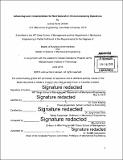Advancing lean implementation for next generation biomanufacturing operations
Author(s)
Jensen, Joshua David
DownloadFull printable version (6.671Mb)
Other Contributors
Leaders for Global Operations Program.
Advisor
Scott Keating and Jung-Hoon Chun.
Terms of use
Metadata
Show full item recordAbstract
Amgen Singapore Manufacturing (ASM) is a "first of its kind" commercial biomanufacturing site, incorporating myriad innovations including a full scale single-use bioreactor production model. Known internally at Amgen as Next Generation Biomanufacturing, this model will be the future of drug substance manufacturing at Amgen Inc. With the creation of Next Generation Biomanufacturing, significant changes are required within site operations including how Lean principles and methodologies are implemented and utilized in this model. An opportunity had been identified to determine an effective Lean implementation for ASM in order to capitalize on its full potential and set the Lean strategy for future Amgen Next Generation Biomanufacturing sites. This thesis has two primary objectives: documenting how Lean principles are deployed within a biomanufacturing operation and investigating potential opportunities for Lean within Next Generation Biomanufacturing. The first objective documents the methodology and results of the author's efforts in implementing Lean principles at ASM for Amgen while the second objective generates hypotheses on elements that will lead to more effective and efficient Lean implementation for future applications of Amgen's Next Generation Biomanufacturing model. These hypotheses were developed with qualitative research conducted within Amgen Inc. through interviews and surveys with Amgen leadership and staff. The responses from these efforts were assimilated with the use of a Grounded Theory approach and three unique hypotheses were created, summarized as: 1) Lean implementation from the start of operations, 2) Site-wide Lean implementation and 3) Technology enabled Lean implementation. Each of these hypotheses were preliminary validated through a quantitative analysis of a process improvement that involved elements of each hypothesis. The results from the process improvement showcased positive reinforcement from each of the hypotheses, with a quantifiable improvement of the process of over 70%. This thesis provides significant evidence on how biomanufacturing operations can improve the efficiency and efficacy of Lean implementations within to their organizations.
Description
Thesis: M.B.A., Massachusetts Institute of Technology, Sloan School of Management, 2016. In conjunction with the Leaders for Global Operations Program at MIT. Thesis: S.M. in Engineering Systems, Massachusetts Institute of Technology, Department of Mechanical Engineering, 2016. In conjunction with the Leaders for Global Operations Program at MIT. Cataloged from PDF version of thesis. Includes bibliographical references (pages 56-57).
Date issued
2016Department
Leaders for Global Operations Program at MIT; Massachusetts Institute of Technology. Department of Mechanical Engineering; Sloan School of ManagementPublisher
Massachusetts Institute of Technology
Keywords
Sloan School of Management., Mechanical Engineering., Leaders for Global Operations Program.